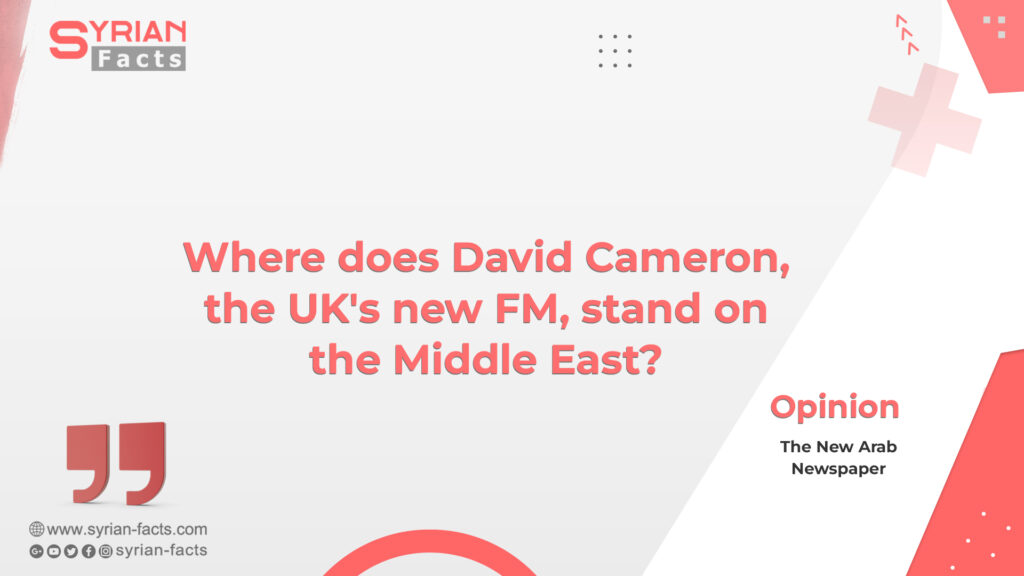Former UK Prime Minister David Cameron has long links to the MENA region. We look at where he stood while premier and how the region has changed since he was given the foreign minister post on Monday.
In one of the biggest recent shocks in UK politics, former Prime Minister David Cameron was announced as the new foreign secretary ending seven years in the political wilderness.
Cameron, who is not a sitting member of parliament, served as UK premier from 2010 until 2016, when he stepped down after Britain voted to leave the EU.
His return to the political fold comes amid a time of turmoil and heartbreak in Gaza.
We look at his past opinions on the Middle East region and how it might shape UK foreign policy under Cameron.
Palestine and Israel
Then: David Cameron was a member of Conservative Friends of Israel as an MP and patron of the Jewish National Fund before stepping down in 2011 while prime minister.
Cameron’s predecessors had remained on as patrons when serving as prime minister and pro-Palestine activists claimed their campaigning led to him giving up the role.
In 2010, during a visit to Turkey, Cameron condemned a deadly Israeli assault on a Turkish peace flotilla to Gaza and urged Israel to end its siege on the Palestinian enclave, which he described as “a prison camp”.
Despite this, Cameron was still a strong supporter of Israel, rejecting calls to have Prime Minister Benjamin Netanyahu arrested for suspected war crimes and strengthening bilateral military and political ties.
The UK’s support for Israel during the 2014 Gaza war led to Baroness Sayeeda Warsi resigning from government in protest.
Now: The UK government is probably closer to Israel than at any other point but Cameron faces a delicate balancing act with huge internal pressure due to domestic anger at the brutal war on Gaza, which has seen hundreds of thousands take to the streets.
Gulf
Then: During his hiatus from politics, Cameron took up a teaching job at an Abu Dhabi university, reflecting the former PM’s good relations with the UAE.
He had also advised Saudi Arabia on their chair of the G20 summit and reportedly struck a good relationship with the kingdom’s de-factor ruler, Crown Prince Mohammed bin Salman.
During his premiership, the UK agreed to sell Saudi Arabia 72 BAE Systems Typhoons – which has since been held up to Germany – along with billions of dollars in more weapons to other Gulf states.
The UK government did not ban the Muslim Brotherhood – despite reported pressure from Saudi Arabia, the UAE and Egypt – after a long-delayed report in 2015 found no links between the Islamist movement and terrorism.
Now: The Gulf will likely be a key focus for Cameron as FM with countries such as Saudi Arabia spending huge sums on arms and infrastructure, and keen for outside investment.
There will also likely be clearer ground for cooperation on regional issues between the UK and Gulf, since much of the post-Arab Spring unrest has died down.
A post-Brexit GCC trade deal still remains elusive, although talks are continuing.
Iraq
Then: Cameron had voted for the Iraq war as an MP back in 2003; more than 13 years later, and close to the end of his tenure as PM, the Chilcot Report was published and found that the UK government took part in the invasion despite Saddam Hussein and his regime posing no direct threat to the UK.
Cameron refused to acknowledge the war was “wrong” or a “mistake” when prompted to do so in parliament.
He had reportedly even wanted to shut down a historic allegations team that was looking into abuse, murder, and torture by British soldiers in Iraq.
Under his premiership, the UK was part of the US-led international coalition set up to fight the Islamic State, the extremist group that had swept through Iraq and Syria in 2014.
Now: While IS has been mostly contained in Iraq, Iran-linked proxies currently pose a greater risk to Western interests, particularly with the anger unleashed at the UK and US over their support for Israel in its war on Gaza.
Iran
Then: Cameron was prime minister at a time of thawing tensions with Tehran, in the lead-up to the 2015 nuclear deal and when reformist Hassan Rouhani was president.
Cameron had initially been hostile to Iran, warning Gulf leaders in 2012 against improving ties with Tehran because of the nuclear threat it supposedly posed.
But in 2013, he was the first British PM to hold a phone call with an Iranian president in a decade. The two leaders would later meet face to face as the nuclear deal came closer to realisation.
When it was signed in July 2015, Cameron said the “historic” deal would “help make the world a safer place”.
Cameron also met Rouhani in 2014 to discuss the war with their common enemy IS, with Cameron urging Rouhani to drop his support for Syrian President Bashar al-Assad, who he said had created the conditions in which the extremist group could thrive.
They met again in September 2015, to discuss a potential revival of the Syrian peace process.
Now: The US has since pulled out of the nuclear accord, while Iran is reportedly ramping up its nuclear programme. Iran and the US remain deadlocked on talks, particularly after the brutal crackdown on pro-democracy protesters in Iran by one of the most hardline governments in Tehran in years.
Syria
Throughout his time in office, Cameron was a staunch opponent of Syrian regime dictator Bashar al-Assad.
In 2013, he pushed for military action against the Assad regime alongside the US with the stated aim of deterring Assad from using chemical weapons on civilians again.
The move was rejected by MPs and British press said the loss dealt a huge blow to his authority as prime minister.
In 2015, Cameron said Assad should only remain in power until a political transition could take place.
The UK would later intervene in Syria as part of the anti-IS coalition. He said teaming up with the Syrian regime and its military, who were also fighting IS, would be a “phony solution” to the war.
Now: Two years after Cameron stepped down, the UK did take part in strikes against Assad’s forces following a chemical attack on an opposition village, but since then the rebels have lost almost all their ground. The UK’s position toward the Syrian regime remains largely unchanged, demanding a political transition.
Turkey
Then: Cameron wanted stronger relations between the EU, UK, and Turkey from the get-go of his tenure, including increased bilateral trade.
He had initially been one of the most ardent supporters of Turkey joining the EU, even describing himself as the “strongest possible advocate for EU membership” for Ankara.
With pro-Brexit campaigners using the potential inclusion of Turkey into the EU to scaremonger, Cameron appeared to reel in his support for accession, saying it wouldn’t happen “until the year 3000” because some member states were likely to veto the deal.
Some in Europe said Turkey had failed to meet EU standards on issues like press freedom or minority rights; others said Turkey’s entry to the union would create a flood of refugees from Syria, Iraq, Afghanistan, and beyond into Europe.
Now: The UK is now out of the EU so would have no role in Turkey’s possible membership in the European bloc. Turkey has troubled relations with the EU and US due to the war in Ukraine and Ankara’s interventions in Syria, along with other matters.





Be the first to write a comment.